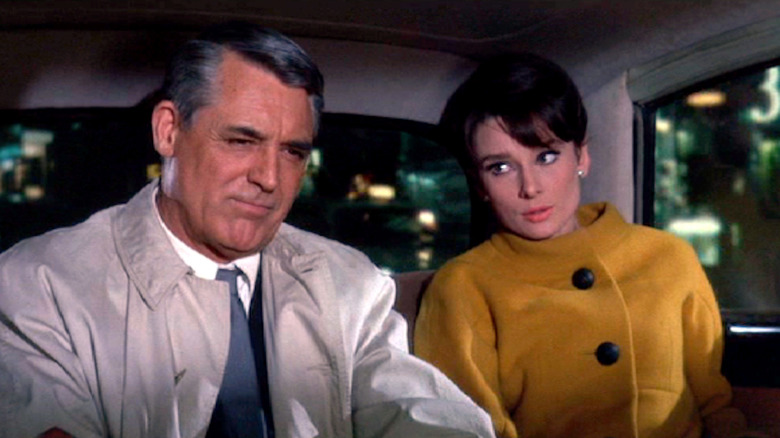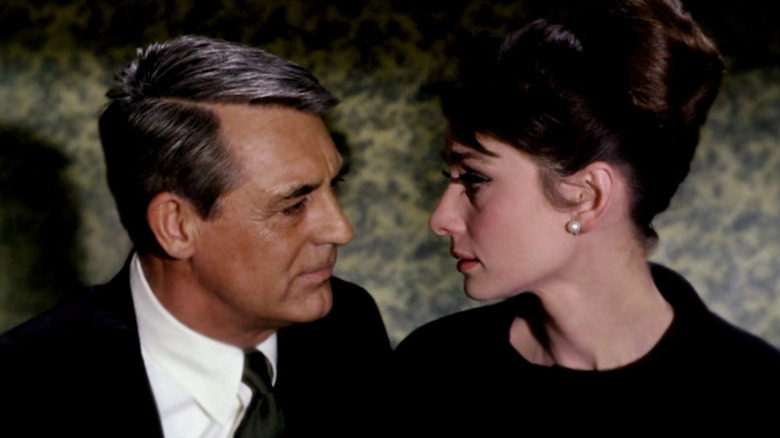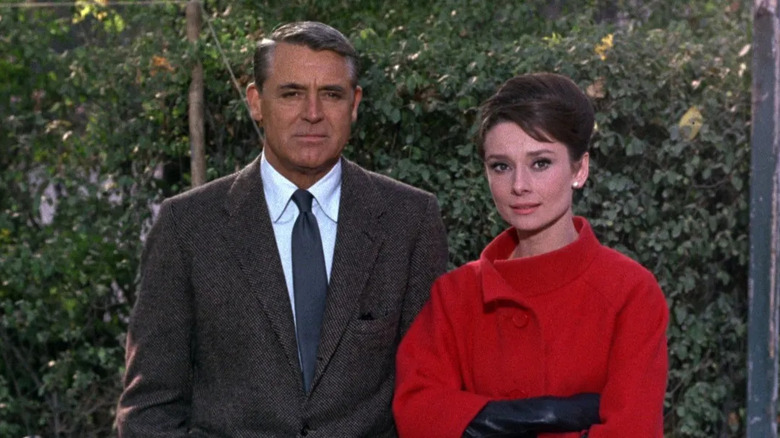Charade Marked The End Of An Era For Cary Grant's Film Career
Cary Grant was 62 years old when he broke the world's heart and decided he couldn't be Cary Grant anymore. It was 1966: He'd just wrapped the romantic comedy "Walk, Don't Run," wherein he provided only the comedy. The romance involved the attractive young duo of Samantha Eggar and Jim Hutton. She was twenty-six at the time. He was thirty-two.
Though some critics raved that the aging star was as charming as ever, Grant knew better. Slotted in the (mostly) sexless matchmaker role, Grant was on the cusp of playing grandfathers and generals and men who are generally unfun because they are about to die. Grant could be complex and more than a little dangerous, but people generally lined up to see him because he was Cary Grant. Did people want to see him grow old? Grant didn't care to find out, so he retired. And he stayed retired despite the entreaties of MGM, which longed to drag "Grand Hotel" out of the archives for a remake, and his dreamboat successor Warren Beatty, who favored him for the Mr. Jordan role in "Heaven Can Wait" that ultimately went to Grant's "North by Northwest" costar James Mason.
And this was all a formality, because Cary Grant had already clocked out as Cary Grant three years earlier in Stanley Donen's "Charade."
A man of infinite possibilities
An espionage thriller that thrusts an adorable Audrey Hepburn into the wrong-person/wrong-place predicament that Grant faced in "North by Northwest," "Charade" is a lighter-than-air thriller that wafts along on the swooning chemistry of its stars. Grant can't conceal his age, but the mileage is never apparent. He's lithe, sparkling, and dead sexy. The key to that last quality is his curiosity. In her seminal essay, "The Man from Dream City," Pauline Kael hit on the exact mechanics of Grant's romantic persona:
"Grant is interested in the qualities of a particular woman — her sappy expression, her non-sequiturs, the way her voice bobbles. She isn't going to be pushed to the wall as soon as she's alone with him. With Grant, the social, urban man, there are infinite possibilities for mutual entertainment. They might dance the night away or stroll or go to a carnival — and nothing sexual would happen unless she wanted it to."
Kael believed Grant was never more appealing than when he was preyed upon. She rightfully highlights Ingrid Bergman's ravishment of Grant in Alfred Hitchcock's "Notorious," where he can barely finish a phone conversation without having to attend to his lover's needs. Hepburn brings a different, far more innocent energy to "Charade." She's a naif, in over her head, but more than capable of catching up. And Grant, a presumably expert provider of pleasure, will be right there waiting for her when she closes the distance.
Last stop, Dream City
Grant surprised two of his former collaborators when he called it quits. Billy Wilder remarked that "Cary Grant would still be a heartbreaker. He would still be the most attractive man on the screen. He did not age one bit. His hair got gray. That's all." Grant's co-star in "The Bishop's Wife," Loretta Young, felt however that "Cary knew when to stop. I think that was part of his genius."
There's obviously no shame in getting older, and many actors have deftly managed this transition, but Grant didn't want any part of it. He'd had a daughter, Jennifer, with Dyan Cannon, and wanted to be a present father. He really had the riding-off-into-the-sunset finale we desire for all our screen legends, but for whatever reason (probably because he turned us on more than his contemporaries), we wanted more from Grant.
Hepburn spoke for all of us in "Charade" when she locked eyes with Grant and asked, "Do you know what's wrong with you?" "No," he responded. "Nothing," she says as she retreats to her room, where she will most assuredly dream of "The Man from Dream City" until she finds a blissful slumber.


